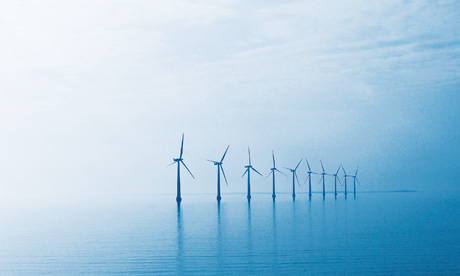Wind will power fossil fuel-free Denmark in 2050, report predicts
Danish climate
commission report predicts the country could switch to renewables by
the middle of the century
•
Salmond claims 100% green electricity in Scotland 'achievable' by
2025

The Danish island of Samso is entirely self sufficient, thanks in part to offshore wind turbines. Now the Danish climate commission predicts wind could see a fossil fuel-free Denmark by 2050. Photograph: Nicky Bonne
The falling cost of renewable energy and rising cost of oil and gas will allow Denmark to develop an energy network entirely free of fossil fuels by 2050, according to a report published by the government's climate commission.
The committee predicted that wind and biomass energy could meet the bulk of the country's energy requirements.
It also argued that switching to renewables would be cheaper than continuing to use fossil fuels, particularly if predictions of soaring oil and gas prices are borne out.
The report was welcomed by Danish wind turbine manufacturer Vestas, which said the research could help further bolster the country's position as a leading generator of onshore wind energy.
"The report will also send a very clear and important signal to other countries that wind is a sustainable source of energy for future development," said Vestas chief executive Ditlev Engel. "This is a great opportunity to solidify Denmark's reputation as a laboratory for green, CO2-free power technology solutions that are globally required."
The report recommended that the government immediately start devoting 0.5 per cent of the country's annual GDP to renewable energy investment in order to help achieve the 2050 target, resulting in a total spend of 17bn kroner (£1.9bn) by 2050.
The Danish climate and energy minister will now consider the commission's report ahead of the release of the government's official climate strategy proposal in November.
guardian.co.uk © Guardian News and Media Limited 2010 To subscribe or visit go to: http://www.guardian.co.uk